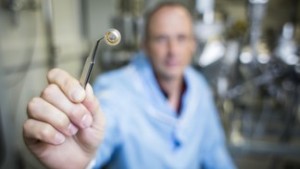Aug 14 2014
EPFL researchers have participated in the development of a contact lens for the early detection of glaucoma. Clinical trials are being conducted at the CHUV.
 © 2014 Reto Duriet
© 2014 Reto Duriet
Glaucoma, which results from excessive pressure in the eye, is the second leading cause of blindness worldwide, after cataracts. Painless and invisible, this insidious disease is often detected too late by doctors, once the optic nerve has already been damaged.
In Neuchâtel, the startup Tissot Medical Research (TMR) commissioned researchers from EPFL and Haute Ecole Arc to develop a single-use contact lens capable of measuring intraocular pressure continuously for 24 hours. This could track glaucoma day and night-a minor revolution for specialists.
Most ophthalmologists use a technique called Goldmann Applanation Tonometry, which consists of applying a kind of cone with the tip flat against the cornea to measure intraocular pressure. While very accurate, this measure can only be done on an ad hoc basis, using an expensive camera in a doctor's office. However, peaks in pressure often occur at night or in the early morning, outside normal consultation hours. Under these conditions, it is difficult to spot abnormal rates of pressure.
A blink, a measure
Composed of silicone, these smart lenses from Tissot Medical Research perform measurements at each blink of the eye, using the same principle as the traditional method. Each lens is equipped with a protuberance that presses against the cornea with each blink. In this bump within the lens, a rigid ring contains a capacitive sensor formed by electrodes. "When the eyelid closes, the bump puts pressure on the cornea, causing the electrodes to come closer together," explains Luc Tissot, founder of TMR. The distance between the electrodes therefore indicates the rate of intraocular pressure. "It's a bit like when you press a balloon to estimate the amount of air inside," illustrates Alexis Boegli, of the Electronics and Signal Processing Laboratory at EPFL (ESPLAB).
Small antennas attached to the patient's glasses regularly capture information collected by the lens. "At night, it might be possible to wear an eye mask, for comfort," says Alexis Boegli. The glasses are connected by a wire to a small portable box that is the size of a wallet. Patients can thereby go about their business while wearing the device.
"After 24 hours, ophthalmologists plug a USB key into the housing and analyze the results on a computer. It is quite possible to send data directly to a smartphone, but experts adhere strictly to the confidentiality of medical information," says Pierre-André Farine, Director of ESPLAB. The results are in turn provided in the nearest millimeter of mercury (mm Hg), allowing to identifying the precise moments of the pressure peaks.
Improving the treatment of glaucoma
Not content to merely detect glaucoma, the new smart lens should also make it possible to measure the biomechanical properties of the cornea, and to adapt the treatment of this disease. "Clinical trials are being conducted at the Ophthalmic Hospital of CHUV. These to gauge the comfort of the device, and also test the measurement system", explains Dr Katia Tissot, the medical manager for the society.
It is worth noting that the lens from Tissot Medical Research is not the only one on the market. Another Swiss company, Sensimed, an EPFL start-up, also has developed a contact lens for the detection of glaucoma. However, it uses a different technology which analyzes changes in circumference of the cornea.
The lens from Tissot Medical Research should be commercially available by the end of 2015.
Source: http://actu.epfl.ch/